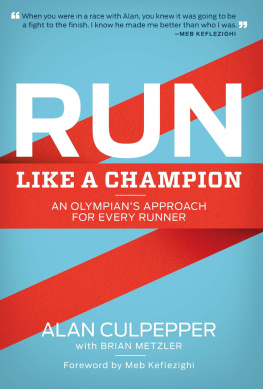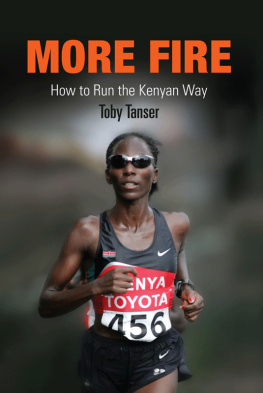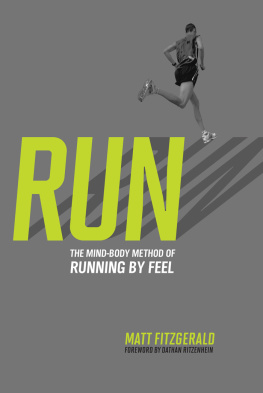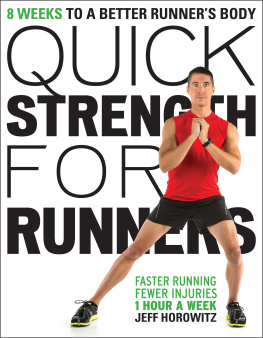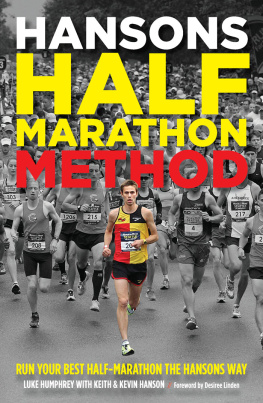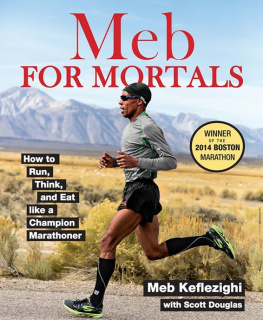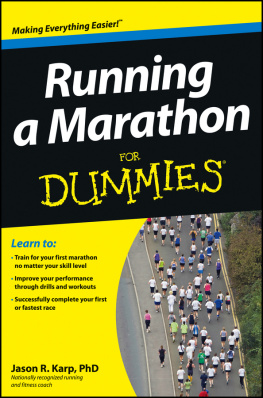

Copyright 2015 by Alan Culpepper
All rights reserved. Published in the United States of America by VeloPress, a division of Competitor Group, Inc.

3002 Sterling Circle, Suite 100
Boulder, Colorado 80301-2338 USA
(303) 440-0601 Fax (303) 444-6788
E-mail
Distributed in the United States and Canada by Ingram Publisher Services
A Cataloging-in-Publication Data record for the printed edition is on file with the Library of Congress.
ISBN 978-1-937715-07-6 (pbk); ISBN 978-1-937716-68-4 (e-book)
For information on purchasing VeloPress books, please call (800) 811-4210, ext. 2138, or visit www.velopress.com.
Cover design by Moxie Sozo and Andy Omel
Author photo by Brad Kaminski
v. 3.1
SPECIAL THANKS TO
My wife, Shayne, and our four boys
My parents and my two brothers, Doug and Chris
Sam Walker and Mark Wetmore
CONTENTS
Alan Culpepper should go down as one of the great American distance runners, both during the era in which he competedfrom the mid-1990s to 2008but also compared to the countrys all-time greats. I have always had a deep respect for Alan because he trained so hard, competed so hard, yet always seemed to have the right balance between running and familyand that says a lot about who he is. He was a fierce competitor with a lot of talent, but he was also very humble and understated in his approach. The key to his success, as you will see in the pages of this book, is that he persistently followed a set of underlying principles that are universal to the development of distance runners of all ages and abilities. He trained hard, but he trained smartly and consistently with the continued application of these principles and a strict attention to detail.
Although he won many races and competed with the worlds best runners in the worlds biggest races, perhaps the biggest achievement of his career was his consistency. For almost 10 years, he never failed to finish among the top three of a U.S. championship race when an Olympic or world championship team berth was on the line. Thats hard to do in the sport of distance running because youve got to be at your best at one specific moment on one specific day. Everything has to be just rightyou have to be healthy, you have to be fit, you have to be peaking at the right timeyet you also have to be mentally focused and ready to compete as hard as you ever have. For Alan to do that and make two Olympic teams and four world championship teams over a 10-year period is phenomenal. Its a sign that he worked extremely hard, was very disciplined, and did the small things on a regular basis. It also shows that he was a true competitor of the highest order, both physically and mentally.
Alan and I duked it out for a long time over the course of our careers. I remember when he won the 1996 NCAA 5,000-meter run during his final year at the University of Colorado (CU) and how impressed I was. (I was a sophomore at UCLA and finished a distant ninth place in that race, 26 seconds behind Alan.) I continued to follow him after he turned pro, and after I finished college and turned pro, I found myself racing against him several times a year, from national championships to major international races. We were always friendly and polite with each other, but we were rivals too. Alan is a great guy, a very gracious competitor, but he was one of the toughest competitors out there. We always shook hands before and after the race, but during the race it was always May the best man win. He got his fair share, and I got my fair share. When you were in a race with Alan, you knew it was going to be a fight to the finish. I know he made me better than who I was, and I hope I made him better than who he was.
Our careers started to take off at about the same time. We had gone head-to-head at the 2000 U.S. Olympic Trials in the 10,000-meter run in Sacramento, California, with me narrowly edging him by three-hundredths of a second to win in 28:03:32 as we earned our first Olympic team berths. In the next few years, we both moved up to the marathon in anticipation of the 2004 Olympics. Alan had run 2:09:41 in his debut at the 2002 Chicago Marathon, and I had run 2:12:35 at the 2002 New York City Marathon and 2:10:03 at the 2003 Chicago Marathon.
Heading into the 2004 U.S. Olympic Trials Marathon in Birmingham, Alabama, Alan was the favorite to win. But when the race started, Brian Sell went out hard, hammering away out front to try to make the Olympic team. Instead of reacting and trying to chase him down, a few of us trusted our training and our instincts and did the work to reel him in. We finally caught Brian around mile 21, and that was where the real race began among Alan, Dan Browne, and me. It was a three-man race with about 5 kilometers to go, but it came down to just me and Alan over the final 2 miles. Alan had better closing speed than I did, so I knew if I had any chance of winning, I had to make a move right there.
With a little less than 400 meters to go, I tried to make a move. I started to wind up my speed and could feel my legs respond with a quicker cadence and a more powerful style for a few strides. But that only got Alan going too, and he just blew me away down the final stretch. He finished in 2:11:42, and although I wasnt far behind in 2:11:47, it was a true testament to Alans fierce competitiveness, consistent training, and tactical racing abilities. He won the race decisively that day and earned his second Olympic berth. I was both thrilled that he had won and excited that I had made my second Olympic team too. There was never a grudge about that or even a wish on my part that I had won the race. It was one of those things where we all raced well and put it out there, and to finish second behind Alan after such a great race was very exciting for me.
The best thing the Olympic Trials raceand losing to Alandid for me was that it helped motivate me in the months that followed. Based on the effort that Alan and I and Dan gave at that race, and knowing the competition would be that much greater in Athens, I trained harder than ever before. It was inspiring knowing we would be running in Greece, where the marathon had its origins. Before the Olympics, the U.S. marathon team spent the final days together on the island of Crete, and I knew from our shake-out runs that Alan and I were both very fit and ready to go. Even though we were both preparing to be as competitive as possible in the race of our lives, we were teammates and talked about strategies such as helping each other spot aid stations as we approached them.
In the end, we both ran very well that day. My silver medal and Deena Kastors bronze medal in the womens marathon might have overshadowed Alans effort, but Alan ran a very strong race in Athens too. He finished 12th in hard conditions that ultimately forced 20 runners to drop from the race. If you consider that four years earlier in Sydney, the United States had had only one entry in the Olympic marathon because there werent many American runners fast enough to make the Olympic standard, to have Alan and me both finish in the top 12 in Athens was a big deal and probably one of the key moments in the revival of distance running in the United States.
One of my most memorable moments in Athens was right after the race. As soon as we saw each other after the finish, I remember Alan giving me an enormous bear hug. In that hug, I could sense how genuinely happy he was for me, and yet it was a celebration for each of us and a reflection of the efforts we had put into training and into that day. It was also a sign of the respect we hadand continue to havefor each other. Alan is a true competitor and a true gentleman.
Next page
